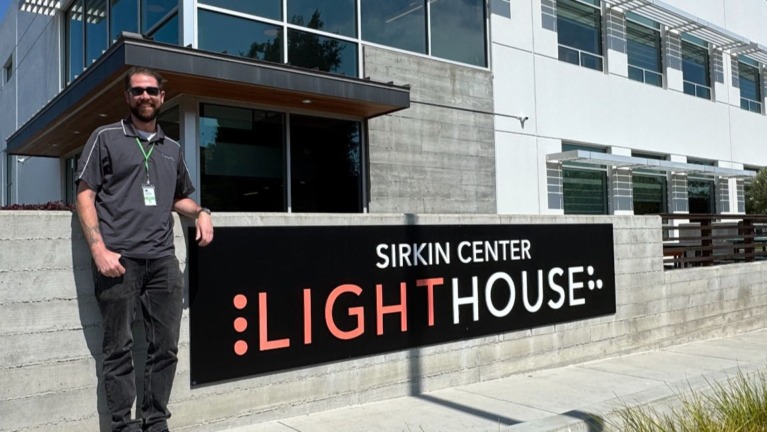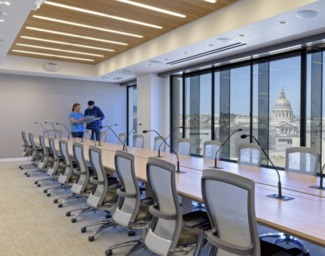Spotlight on Resilience: A Journey of Growth and Leadership at LightHouse Eco
Spotlight on Resilience: A Journey of Growth and Leadership at LightHouse Eco
By Summer Dittmer

Growing up in Santa Rosa, California, Taylor Wall never thought of himself as different from his peers. In school, he sometimes noticed classmates seemed to navigate the classroom or soccer field more easily, but he assumed they were simply more skilled. Throughout middle and high school, as his vision began to worsen, he suspected there was a bigger issue at hand- a suspicion he thought best to keep to himself. After all, there was a slim chance that everyone else saw the world like he did-minimal night vision, with normal peripheral vision, clouded by massive blind spots in between. It wasn’t until age 23, when his mother asked him to drive a trailer during his sister’s move, that he confronted a deeper truth: his vision loss was becoming too significant to ignore, and driving was too risky.
After disclosing what he had successfully hidden for years, his mother, a Sutter Health employee, lined him up with every possible resource. Appointment after lengthy appointment, and test after test, Wall was eventually diagnosed with Retinitis Pigmentosa (RP), a rare genetic condition that leads to the deterioration of the retina and causes progressive vision loss. While the diagnosis meant making sacrifices, like giving up driving, it was also a relief. Finally, he could put a name to the challenges he had been experiencing for years.
Determined to move forward, Taylor initially sought out resources at the Earle Baum Center in Santa Rosa, which led him to the LightHouse for the Blind in San Francisco. Through career services, resume coaching, and interview practice supported by the Department of Rehabilitation, he soon gained the skills he needed to begin a new career path.
To Wall’s unfortunate surprise, his first professional opportunity after training didn’t go as planned. Despite excelling in the role and disclosing his vision loss from the start, he was “medically terminated” due to his RP. “It was so frustrating because I was doing the job really well, and they knew about my diagnosis the day they hired me,” Taylor recalls.
What felt like a setback became what Taylor now calls the major turning point in his life. Soon after, he applied for and was hired as a production assistant at LightHouse’s Sirkin Center. Surrounded by blind and low vision colleagues, he experienced a completely different workplace culture, one where shared life and workplace knowledge, combined with exposure to accessibility tools, made him feel both supported and inspired.
Taylor thrived in his new environment, quickly earning promotions from line lead to blending technician. Motivated by the story of former LightHouse CEO, Sharon Giovinazzo, who began on the warehouse floor and climbed the nonprofit ladder, all the way to CEO, Taylor set his sights He aimed higher; he chose to pursue a new and challenging position, and after several interviews, LightHouse offered him the job. Earlier this year, he assumed his newest role as Assistant Director of Production Manufacturing at LightHouse Eco.
“Oh yeah, I love it,” he says with a grin when asked about his role. “I learn new things every day. My coworkers always open my mind, about work and about life. There’s so much I only know now because I work with other blind people, from free audio libraries and the availability of audio described shows like Sopranos (which I never knew existed!) to inverted screen colors and the benefit of magnifiers.” He glances down at his wrist, “I mean even this watch I just got from Adaptations came from a coworker’s suggestion; it talks! I just push this button and it tells me the time. The simplest things can make life so much easier.”
Taylor’s story is one of resilience, adaptability, and hope. With gratitude and determination, he looks to the future with clear goals: “I want to keep working my way up. I want others to know they can do the same.” His advice to those newly navigating blindness or low vision:
“Don’t be embarrassed about your diagnosis, or about explaining your vision loss to people who don’t understand. People want to know more, and there’s more for you to learn too. Ask questions. Remember, your life is not over. There are jobs and people just like you. Try to remember there are opportunities to grow and move forward.”
This October, as we celebrate National Disability Employment Awareness Month, Taylor’s journey reminds us of the power of perseverance and the opportunities that come when inclusion and accessibility are part of the workplace.


